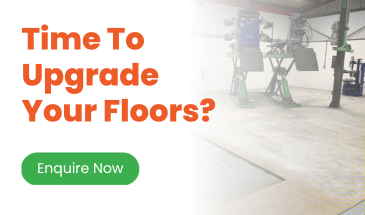The BRC’s (British Retail Consortium) Global Standard for Food Safety is the golden benchmark for UK food processing and distribution businesses, requiring businesses to demonstrate a documented food safety quality management system and established environmental controls throughout their factory environment. A BRC certificate is a strong indication of consumer protection and legal compliance, and to achieve certification, businesses must undergo a stringent independent BRC food safety audit to demonstrate adherence to the required standards.
Customers are unlikely to buy from you if you fail your audit or get a low grade, and if you fail on any non-conformance criteria, you only have 28 days to correct it.
Site hygiene standards are, therefore, an important factor in a BRC food audit, with a clean site and strong hygiene protocols being a central factor in demonstrating compliance. A commercial resin flooring system can help you maintain a superior level of safety and cleanliness throughout your site, making it easier to comply with BRC audit requirements and creating a nonslip and easy-to-clean operating surface for your team.
Ensuring Superior Food Safety And Quality Through Resin Factory Flooring
An aspect of food safety that is often overlooked when preparing for a BRC audit is the impact of the factory flooring itself on food safety standards. The type of flooring used in a food production facility can have wide-ranging and significant impacts on food safety, with a poorly chosen or maintained floor capable of harbouring harmful bacteria and acting as a source of physical contamination for foodstuffs.
Commercial epoxy resin flooring has emerged as a popular choice among food production enterprises due to its durability, easy-to-clean surface, and resistance to both chemical cleaning products and heavy wear and tear. The smooth surface of a commercial resin floor system also makes it intrinsically more hygienic. Compare this to the standard concrete flooring systems used in many food production facilities. Under the microscope, a concrete floor is an intricate maze of pits and gullies, creating a perfect haven for the accumulation of grease and food particles, and whole ecosystems of bacteria that are largely shielded from the effects of surface cleaners.
Under the same microscope, a resin floor surface is completely and eerily flat, with no refuge for any microorganisms or contaminants, and the result is that hygienic resin floor systems are far easier to keep clean, and to a higher standard, than any other food production flooring option.
Commercial Flooring Systems From ARTI Lt
Preparing for a BRC food safety audit is no easy task, so having a flooring system in place that supports you in implementing the highest food safety and quality standards gives you one less thing to worry about. While installing a high-quality resin floor in your factory won’t guarantee that you ace your BRC audit, it can certainly help you avoid unnecessary scrutiny and improve your chances of success.
To find out more, please contact our experienced team of commercial flooring specialists at Advanced Resin Technologies (International).




